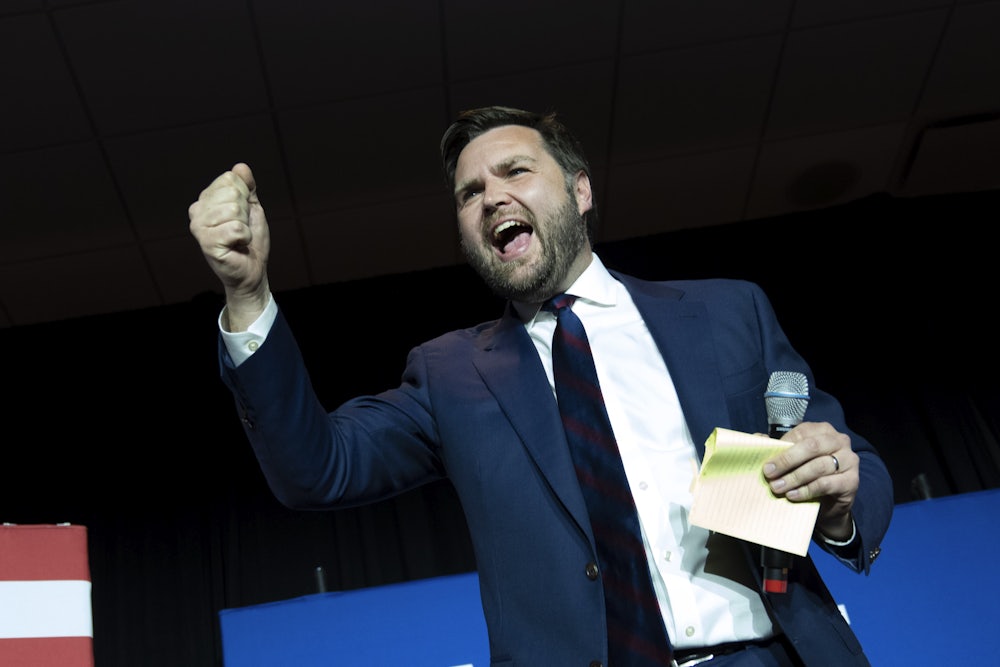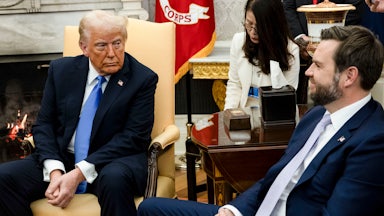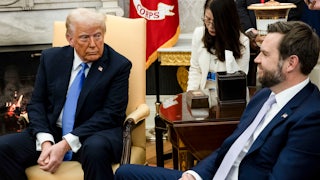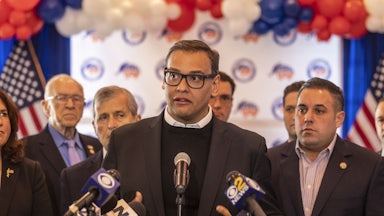Blake Masters and J.D. Vance, Republican nominees for Senate in Arizona and Ohio, respectively, have two things in common. One is that they’re both terrible candidates—charisma-free voids, running on a slate of radical, unpopular policies. Another is that they’ve become Trumpworld favorites despite each having a history of MAGA heresies. Masters was in favor of unrestricted immigration before he was against it; Vance called Donald Trump “cultural heroin” and spent most of the 2016 election trying to position himself as a kinder, gentler Republican that the GOP could turn to after Trump got slaughtered in the general election. Whoops!
But they share another interesting commonality: The only reason that they’re candidates at all is because Peter Thiel—their former boss—backed both with substantial donations. Once they won Trump’s endorsement, their party’s nomination was basically secured. Now, unsurprisingly, both are struggling against Democratic rivals who have run relentless campaigns highlighting both their extremist policies and their shared history of working in the finance industry. Masters has consistently trailed against his Democratic opponent, former astronaut Mark Kelly, a popular Democrat who is running ahead of the venture capitalist in spite of the general incompetence of the state’s other senator, Democratic albatross Kyrsten Sinema. Vance, meanwhile, is running neck-and-neck with Tim Ryan, who is running a populist campaign and vastly outperforming expectations in a state that Trump won by more than eight points.
Not long ago, Republicans were looking at a favorable electoral map—and certain control of both houses of Congress. Now Democrats are surging, and the GOP only has itself—and Thiel and Trump who handpicked so many of its failing candidates—to blame.
Earlier this year, Thiel was touted not just as the next Republican megadonor but as the party’s prime theorist—the higher mind shaping the future of the right. Donald Trump’s hold on the Republican Party is powerful, if not absolute; but it’s short on ideas, original or otherwise. Much of Trump’s political project revolves around personal loyalty and policies that seem to have been hastily plucked from a grab bag of old-school Republican positions (build a border wall, deregulate everything, cut taxes for the wealthy). His monomaniacal focus in recent years has been his denial of the legitimacy of the 2020 election. Thiel has attempted to backfill this vacuum by burnishing some of Trump’s less passionate positions—on foreign alliances, for instance—while pushing a vision of this own that revolves around an unrelenting assault on both democracy and the idea of any level of wealth distribution from rich people like himself to, well, anyone else.
Thiel is not just anti-democratic, he’s a techno-elitist—Vance and Masters used to work with him; both are extremely wealthy venture capitalists. Although they have run campaigns based around nativism and xenophobia—what some call “right-wing populism”—they remain deeply opposed to policies that might either benefit the poor or inconvenience the wealthy. Vance and Masters are also notably lacking the “common touch” that most practiced politicians develop—which is hardly a shock given they have spent several years working in finance. (The latest hilarity is that Vance has scheduled a rally with Donald Trump at the same time as an Ohio State football game.)
Thiel will no doubt continue to build his ideological project and pursue his political interests: protecting the plutocratic class from all incursions, promoting hostility toward China, degrading international institutions, and weakening the social welfare state. He has hit on a formula familiar to many Republicans: aggressively push red-meat culture-war issues like immigration while quietly undermining democracy and transferring wealth to the richest Americans. Thiel hasn’t yet gotten the formula right: His candidates are pushing ideas so extreme on every front that voters are recoiling. (It, again, does not help that both Masters and Vance have distinct vampiric qualities in common with Thiel.)
Some of Trump’s handpicked candidates—like Dr. Oz in Pennsylvania—are faltering for similar reasons: The TV doctor seems confused by basic facts of life and seems to know next to nothing about the state he is ostensibly running to represent in the U.S. Senate. But others are faltering simply because Trump’s only criterion for an endorsement is loyalty: Herschel Walker, running for Senate in Georgia, is rarely coherent on any topic but knows how to kiss the ring.
The reliance on this batch of whackadoo candidates pushed by Trump and Thiel has seriously dimmed the GOP’s chances of retaking the Senate—and may even result in Democrats expanding their hold on the chamber, an impressive feat given Joe Biden’s lagging popularity and the realities of midterm elections. In fairness to these two wannabe kingpins, just about everyone in the Republican Party is screwing up at the moment: Florida Senator Rick Scott, chair of the National Republican Senator Committee, has squandered tens of millions raised from donors. This has been the cause of much backbiting between Republicans behind the scenes. A more immediate problem is that Vance and Masters are now scrambling for cash—and Thiel, perhaps recognizing a bad investment, is suddenly declining to provide it.
Things may still turn around for Thiel, Trump, and the GOP—the midterm elections are two months away. But Labor Day has come and gone, and their candidates have no momentum. It may yet be the case that some combination of Trumpism and Thielism becomes the Republican Party’s future. If the current state of play suggests anything, it is that this will be a very stupid future.










